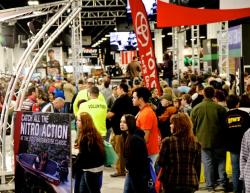Dockworkers Strike Keeps Fishing Gear From Anglers
from The Fishing Wire
“We have hundreds of containers sitting offshore right now,” one fishing industry executive told me last week at the Bassmaster Classic, “the country’s losing hundreds of millions of dollars every day and the administration doesn’t even seem to notice-or care.”
Thousands of containers on hundreds of ships clogging ports on the west coast may finally begin to unload as a tentative five-year agreement has been reached after nine months of extremely contentious negotiations between the International Longshore and Warehouse Union (ILWU) and Pacific Maritime Association (PMA). On Friday evening, the groups issued their joint announcement crediting Labor Secretary Ray Perez with helping break the stalemate.
These latest rancorous disturbance is really nothing unprecedented in a rocky relationship that traces its roots back to the great depression. This latest slowdown was never really a strike, because dockworkers used what owners called “questionable safety violations” to slow work to a crawl. In retaliation, the owners cutting nights, weekends and overtime hours in retaliation.
But not everything is immediately back to normal. Industry officials I’ve spoken with tell me it will take “some time” go get supplies of finished goods and manufacturing components back to normal levels. The Port of Los Angeles, for example, has as many as 54 ships waiting to offload and hundreds of containers sitting on the docks waiting to be processed.
Crowds of consumers walked, shopped and even purchased product as the 2015 Bassmaster Classic visited Greenville, South Carolina. Jim Shepherd/OWDN photoThe Port of Oakland says it may need eight weeks to catch up with processing, and that it, like Los Angeles, will work to offload perishables and other needed cargo as priority items.
As the fishing crazy crowd wandered through the exhibits of the 2015 Bassmaster Classic, they really had no way of knowing that many of the new items on display weren’t available for purchase. That’s because, as one exec told me, “they don’t know just how deeply this slowdown has cut into the country’s safety net of product supply.”
Overall, the mood at this year’s Classic was improved over the last couple of events. The mood was lightened somewhat last year as boat manufacturers reported they were finally seeing a consumer resurgence after four years of a faltering economy. This year several manufacturers tell me their big challenge isn’t rolling out new product, it’s keeping up with demand.
Upgrades to existing boats remained a hot market, but manufacturers like Rigid Industries, manufacturers of high-end performance LED lighting for vehicles, say that while demand remains strong in that category, many new buyers are planning the lighting upgrades into their original purchasing budgets.
